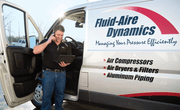Why does an air compressor shut down when it gets too hot? Most modern industrial compressors have an automated thermal cutoff system that turns off the compressor motor if the unit gets too hot, which prevents damage due to overheating. However, if your air compressor is shutting down frequently due to temperature control issues, that is a sign that something deeper is wrong in the system. Getting to the bottom of air compressor overheating issues will prevent bigger problems down the road.
Why Do Air Compressors Overheat and Shut Down?
Air compressor overheating is the #1 cause of unexpected shutdowns during operation. Temperature sensors inside the air compressor monitor air intake and discharge temperatures as well as oil temperatures. In most industrial compressed air systems, the temperature sensor is wired to a thermal cutoff switch that will cut power or stop the compressor from making air until it has cooled down. When your air compressor shuts down as temperatures rise, this is a sign that this system is working properly. Shutting down or unloading the compressor when it is too hot will prevent further damage to the machine. If the system shuts down frequently, this indicates a problem that needs to be addressed.
What Causes an Air Compressor to Overheat?
Air compression generates a lot of excess heat — in fact, about 80% of the energy that is put into the compressor is lost to heat. Known as the heat of compression, this is a natural consequence of the physics of air compression. If this excess heat is not properly dissipated, it raises the operating temperature of the compressor to unsafe levels. Air compressor motors and air ends, like all mechanical systems, are also subject to overheating due to friction when parts rub together. Here are some of the most common causes of overheating in an air compressor.
Low Oil Levels or Degraded Oil
In an oil-flooded rotary screw or reciprocating compressor, circulating oil is used to lower internal temperatures in the air end. Lubrication also reduces friction between moving parts (such as bearings). In a screw compressor, oil also creates a seal in the air end. If oil levels get too low, the oil can no longer do its job of dissipating heat. At very low oil levels, your system will experience excessive friction between moving parts, which generates more heat and puts excessive wear on parts. Old or degraded oil will also cause problems. If oil is not changed frequently enough, it starts to harden and lose its lubricating powers. It can also cause varnish buildup inside the air end, resulting in higher friction.
Poor Ventilation
Poor ventilation in the compressor room is another common cause of air compressor overheating. Air compressors require lots of airflow around them to carry away all the heat they generate. Without proper ventilation in the compressor room, temperatures will quickly rise, causing the system to overheat. You may also experience overheating if the area immediately around the compressor is not kept clear.
High Ambient Temperatures
What is the ideal operating temperature for an air compressor? Most industrial air compressors are designed to work in ambient temperatures between 50-85°F. When operating the compressor at temperatures above 85°F, internal temperatures can rise above 180°F. In addition to putting pressure on after-coolers, high internal temperatures cause the oil to degrade much more quickly.
Clogged Filters or Hoses
Loaded filters or clogs in your air distribution system cause the system to work harder to overcome the pressure drop around the clog — and the harder your system works, the more heat it generates. Inline filters and intake filters become loaded over time as they collect particulates and contaminants. Contaminants can also clog hoses and other elements. These blockages in your system raise the risk of overheating.
Thermal Valve or Oil Pump Malfunction
The oil circulating system keeps oil flowing through the air end and cooling system. When oil gets too hot, the thermal valve opens to allow it to flow through the oil cooling system. The oil pump returns oil to the air end. If either of these parts fails, oil will not circulate properly, and the compressor will eventually overheat.
Over-Cycling
Over-cycling can be a problem for piston air compressors in particular. Over-cycling refers to exceeding the recommended air compressor duty cycle. Most piston compressors are designed for intermittent use (even those rated at 100% duty cycle). If they do not have enough time to rest in between periods of making air, they are prone to overheating. This can happen when air is being used faster than the compressor can keep up with within its normal duty cycle. Continual over-cycling puts extra strain on compressor parts and raises internal temperatures.
Cooling System Malfunction
Air compressors rated for continual use, such as oil-lubricated rotary screw air compressors, will usually have an external oil cooler and aftercooler. The cooling system carries away some of the excess heat of compression to keep temperatures within the recommended operating range. If the cooling system is not working, temperatures in the compressor will rise to unsafe temperatures. Air compressor cooling systems can be either air-cooled or water-cooled. An air-cooled system may fail if the fan stops working or the cooling fins become caked with dust or grime. A water-cooled system may fail if there is insufficient liquid, if there is a blockage in the circulating system, or if the pump stops working.
Air Compressor Type and Capacity
If you are experiencing frequent air compressor overheating, it may be that you simply do not have the right air compressor for your demand. For example, a piston compressor designed for intermittent use should not be used for continual demand applications; a rotary screw air compressor is recommended for 24/7 operations. If your compressor does not have adequate CFM to keep up with your air demand, your system will experience excessive strain and be prone to overheating and failure.
Signs that Your Air Compressor Is Overheating
How can you tell if your air compressor is overheating? If the air compressor is running hot, you will probably notice that it is hotter than normal to the touch. (Note that it is normal for air compressors to throw some heat; pay attention when the unit feels hotter than typical during operation). You may also notice unusual smells, such as the smell of burning oil or hot rubber from belts and gaskets. Other signs of air compressor overheating include unexpected shutdowns, failure to turn on, tripped breakers and accelerated wear.
Compressor Shuts Off Unexpectedly
Remember that your air compressor probably has a thermal cutoff switch that will cut the motor when it starts to overheat. This is done to protect your motor and air end from damage caused by running hot. If your air compressor shuts off due to overheating, it is a sign that this failsafe system is working as intended. If this happens once — for example, when you know you are pushing the compressor beyond its rated duty cycle — you can let the compressor cool down and try again. But if the compressor shuts off repeatedly, you will need a diagnostic to figure out the reason.
Compressor Doesn’t Turn On
If the compressor does not turn on, it may be because the internal temperatures are still too high. Let the compressor cool down completely and try again; if it starts this time, heat was probably the issue. If you find that the compressor takes longer and longer to cool down internally between cycles, that is a sign that the compressor is running too hot during operation or the cooling system is not working properly. If the compressor still does not start after it is completely cool, you have another problem to deal with (which may or may not be related to overheating).
Circuit Breaker Activation
The circuit breaker for the air compressor will trip if the compressor is drawing too much power. There can be many reasons for this, including a short in the motor or other electrical problems. But this can also happen when the compressor is working too hard due to overheating. Clogged or dirty filters, damaged pumps, malfunctioning cooling systems, or low oil levels may all cause your compressor to work harder.
Oil Issues
When the compressor runs hot, the oil degrades more quickly. The smell of burnt oil indicates a serious problem that must be addressed immediately. You may notice changes in oil consistency, smell or visual appearance. Lubricants break down more quickly when exposed to excess heat, which makes them less effective. Petroleum-based lubricants (used in many piston-style compressors) start to oxidize at ~240°F, forming varnish. Synthetic lubricants (used in most rotary-screw compressors) may perform better in the heat, but they will still degrade much more quickly at temperatures above 200°F. If not addressed, poor lubrication will cause irreversible damage to the air end.
Accelerated Wear
Overheating will cause parts in the compressor air end and motor to wear more quickly. You may notice that the compressor is less reliable and requires service more often, perhaps even failing soon after routine preventative maintenance. Belts and gaskets crack or become misshapen under heat stress. Overheating can also warp metal parts or increase friction and wear between moving parts. Just a single episode of serious overheating can permanently damage the compressor air end or motor. Even low-grade overheating will cause excessive wear and shorten the lifespan of the compressor.
What to Do to Prevent Your Air Compressor from Overheating
Fortunately, air compressor overheating can almost always be avoided with proper maintenance and care. It is important to pay attention to the signs of overheating and fix them promptly to protect your unit.
Improve Ventilation
One of the most important things you can do to protect your air compressor is to ensure that there is adequate space around the unit to permit airflow and proper ventilation in the compressor room. Crossflow ventilation in the compressor room will help keep ambient temperatures down. For industrial air compressors located indoors, it is advisable to have a mechanical exhaust ventilation system to pull hot air out of the compressor room and a makeup air system to push in cool, fresh air. Make sure there are no obstructions in front of air vents and the space around the compressor is kept clear.

Monitor Oil Levels and Filters
The second thing you can do to prevent air compressor overheating is to make sure that there is adequate lubrication and the oil pump system is working properly to circulate oil. Remember that circulating oil is an important part of the internal cooling system for an oil-flooded compressor. When oil levels are too low, or the pump is not working, the oil cooling system does not work. Follow all maintenance recommendations for oil and oil filter changes and check oil levels and oil quality frequently. Do not allow oil levels to become low. If oil appears thick, opaque, discolored, or contaminated, or if it has a bad smell, change it immediately, even if it is not yet the scheduled time. Oil should also be tested on a regular basis (every six months for most industrial air compressors) to detect signs of problems with the compressor.
Check Thermal Valve
If you are experiencing frequent shutdowns due to overheating, it makes sense to check the thermal valve in the circulation system to see if it is malfunctioning. Replacing a faulty thermal valve is a fairly cheap and simple repair that will ensure that your oil cooling system is working properly.
Regulate Ambient Temperature
Remember that air compressors work best in ambient temperatures between 50-85°F. For indoor compressors, consider improving ventilation in the summer or, as a last resort, using facility air conditioning to cool the compressor room (this will be an expensive option). If the compressor is located outside, provide shade to protect it from the hot sun. If it is not possible to lower ambient temperatures for intake air below 85°F, it will be very important to monitor the cooling systems to make sure they are keeping up with the excess heat.
Stay on Top of Routine Maintenance
Don’t neglect preventative maintenance! Regular inspection and PM service will help you detect emerging problems that could lead to overheating of the air compressor. In addition to maintaining the oil and oil filters, you also need to clean and check the cooling system to make sure it is working properly. Other maintenance items include checking and changing intake and inline filters, checking belts (for belt-drive compressors), pressure gauges, temperature gauges and other system components. A system that is well-maintained has a much lower risk of overheating.
Can You Repair an Air Compressor Yourself?
Can you perform your own compressor repairs? It depends on the type of compressor and the capabilities of your in-house maintenance team. Small piston compressors, such as those sold for consumer use, are simpler to maintain and repair on your own. But large industrial compressors (such as rotary screw compressors) require specialized skills for proper maintenance, diagnostics and repair. If the cause of air compressor overheating isn’t immediately apparent and fixable (such as a poorly ventilated compressor room), it is best to talk to an expert.
Conclusion: Preventing Air Compressor Overheating
Overheating has an irreversible impact on the lifespan of your compressor, regardless of the reason. Each time the compressor overheats, more damage is done. That’s why it’s important to diagnose and resolve any causes of air compressor overheating as soon as possible.
If you are having trouble with air compressor overheating, talk to the air compressor repair specialists at Fluid-Aire Dynamics. We can help you diagnose overheating issues and find the best solution. Contact us to request an appointment.




